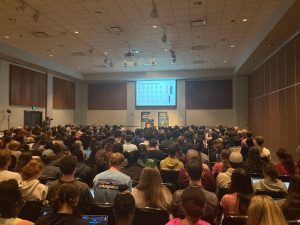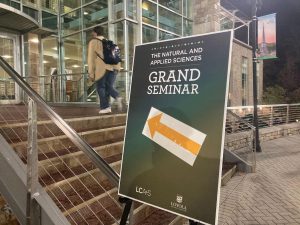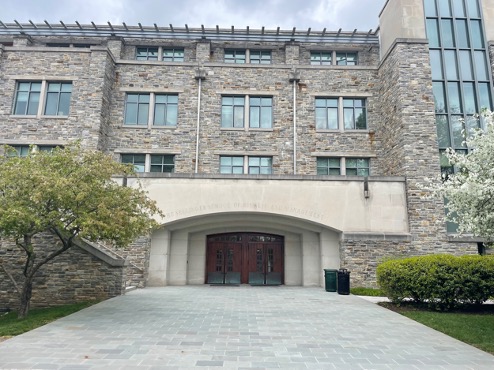Every year since 2011, Loyola’s academic division of Natural and Applied Sciences has hosted the Grand Seminar delivered by a notable guest speaker. On Nov. 7, this year’s Grand Seminar lecture was delivered by notable genome scientist, one of TIME magazine’s 100 Most Influential People, and Loyola alumnus Dr. Adam Phillippy. Phillippy works as a senior investigator at the National Human Genome Research Institute in Bethesda, Maryland.
“His work has contributed to a wide range of applications including forensic investigations, outright tracing, plant and animal breeding, biodiversity preservation, and the diagnosis of rare genetic diseases,” said Provost and Vice President for Academic Affairs, Dr. Cheryl Moore Thomas, who introduced Phillippy at the event.
In March of 2022, Dr. Phillippy’s research group led the finishing effort to publish the first fully complete, gapless sequence of a human genome. For his accomplishments, Phillippy was named as one of the most influential people of 2022 by TIME magazine. That same year, he was also awarded Loyola’s Natural and Applied Sciences Alumni Award, which he said he was honored to receive.
“I will say that the NAS award does mean a lot more to me than the TIME Magazine because it’s all about from whom it’s given, and the people that presented that to me last year mean a lot more to me than those at TIME magazine. So I’m very honored,” Phillippy said as the audience laughed.
In his lecture, Phillippy spoke about his years of research at the National Human Genome Research Institute, and explained aspects of genomics in terms the audience could understand.
“So, I’m going to start all of you off, assuming you knew about as much as I did at the time, and this is really all you need to know for this talk, is that the genomes of any individual are entirely comprised of this four letter alphabet: A, C, G and T. We call them base pairs because they always come together as A with T and C with G. A single human genome is about 3 billion of those A-C and G-T’s replicating continuously,” he said.

A simple definition of “genome” from the Oxford dictionary is said to be “the complete set of genes in a cell or living thing.”
Using the Computer Science degree he earned at Loyola, Dr. Phillippy illustrated the human genome and the different parts of genetic material as essentially computer programming for humans.
“These little computers are taking cues from the environment and other cells around them, executing their little genomic code and creating outputs. And so I kind of approached this problem as the genome from the idea that this is a code to be understood and analyzed. And I’m not the first one to think like this. When we talked about the genome, people often called it the code of life,” said Dr. Phillippy.
The seminar finished on an inspiring note, as Phillippy gave an overview of the myriad of things that the completion and continuing study of the human genome can unlock for humanity going forward. For example, rare genetic diseases can now be identified and treated effectively, whereas, in the past, people would remain unsure about how to move forward. Phillippy shared with the attendees a story exemplifying just this.

“This is just one example of a young Nigerian girl with rickets, which is a bone deficiency basically from lack of vitamin D causing very weak, fragile bones. This was a blood sample from Nigeria, shipped to the NIH, sequenced by the Undiagnosed Disease Program, and they identified a mutation in this one specific gene that was known to be related to acidosis. They knew she had rickets but not what was causing the rickets. By finding that mutation, they now know that acidosis is the cause and can start an alkaline potassium treatment. She should walk again after this. Whereas before, she was restricted to a wheelchair at all times,” he said.
Dr. Phillippy spoke about his past work and amazing discoveries in completing the genome, but his seminar highlighted all the good that will come from it and that will continue to develop into the future.









































































































